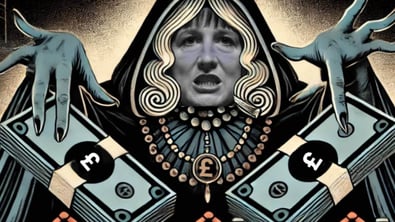Mortgage approvals have fallen by 7,000 last month, according to the Bank of England.
The new figures show the latest in a series of impacts that the mini-budget has had on the economy.
What does this mean for property investors? This blog post explains.
What is a mortgage approval?
A mortgage approval occurs when a lender has reviewed the client’s financial situation and confirmed the client has the ability to take on mortgage payments.
During this process the lender estimates how much the client can afford to borrow, the suitable interest rate and how much mortgage payments are.
What criteria do you need to meet to get your mortgage approved?
Age: The vast majority of lenders require mortgage applicants to be at least 18 years old. It can also feature a maximum age, both when the mortgage is taken out and when the term ends.
Employment status: Lenders will be interested in the employment type to determine how much and how regularly the client is paid. If the client has received a salary for a number of years then they are likely to be improved for this criteria, but if the client is self-employed, works part-time or is a contractor, it can be trickier.
Type of property: A non-standard property, such as a house with a thatched roof, a flat above a shop or a barn conversion, the lender may have concerns over the resale potential.
Credit rating: Lenders will look at credit reports in order to establish how good the client has been at paying back loans in the past.
Size of the deposit: Lenders will take into consideration the size of the deposit. The larger the deposit, the greater the chance of having the mortgage approved.
What has happened to mortgage approvals recently?
Bank of England statistics show mortgage approvals for house purchases decreased to 51,000 in October from 66,000 in September.
Net borrowing of mortgage debt by individuals decreased from £5.9 billion to £4.0 billion last month. This was the lowest level in almost a year.
Approvals for remortgaging with a new lender increased slightly in October to 51,300 from 49,500 in September.
How are mortgage approvals influencing the property market?
Jonathan Samuels, CEO of property lender Octane Capital, says: The latest mortgage approval figures are an expected consequence of the many challenges facing the market right now. Indeed, a reduction in buyer appetite comes as no surprise in the context of a worsening cost of living crisis, runaway inflation, and continued economic uncertainty. For now, at least.
“However, despite the doom and gloom, the figures may defy the harshest critics as they have not dropped off a cliff so much. Compared to historic levels for this time of year they are down 12% when compared with previous levels seen in the same month in 2017, 2018 and 2019.”
Jason Tebb, CEO of OnTheMarket.com, said: “Our own figures show sentiment remained remarkably robust in October despite political and economic uncertainty, with 60% of properties sold subject to contract within 30 days of being advertised for sale.
“With interest rates and the cost of living continuing to rise, buyers may have less buying power but earn in challenging markets, people need to move. Sellers should take advice from experienced local agents and price realistically or may find their properties stick on the market.”
Marc von Grundherr, director of Benham and Reeves, said: “Although today’s mortgage figures will bring no cause for celebration, they are certainly no cause for alarm either and the decline seen is almost certainly a consequence of a disastrous mini-budget which still lingers in the air while the market seeks to navigate multiple challenges.
“But we must factor in seasonality too whereby mortgage applications always begin to reduce at the onset of winter. As fixed rate mortgage costs continue to fall in Q1, expect to see a restoration of buyer demand.”
James Forrester, managing director of Barrows and Forrester, said: “The decline in approvals and monies actually lent is the latest dent to property market sentiment, and is almost certainly down to a government that will be heavily featured on Santa’s naughty list this year.
“However, we also need to remember that the decline towards pre-pandemic normality is expected and in part due to the influence of a seasonal market slow down. Armageddon this is not.
Iain Crawford, CEO of Alliance Fund, added: “The property market ebbs and flows and is well known to be cyclical. Yes, we’ve seen turmoil in the interest rate markets since the flawed Kwasi Kwarteng budget and the effects on money costs is feeding through to buyer sentiment for sure.
“But wait. Property owners have enjoyed a rather sweet time of late and even if there is an adjustment of 5% to 10% in prices, these owners are still well ahead of the game on accrued value.
“2023 will be a leaner property market, that is undisputed. But talk of price crashes and meltdowns are wide of the mark given that medium term mortgage rates are already dropping significantly.”
What do the mortgage approvals mean for property investors?
The property market is continuing to boom, with current annual house price growth standing at 8.1%.
The tightening of mortgage approvals has consequences for property investors, including opportunities.
The first consequence is fewer first time buyers on the buying market, as higher deposits and less disposable income have an effect. The result of this is less buying competition and this could lead to better value for money.
It can also mean that these individuals add to the rental market, stimulating more demand for letting properties.
For more information call us on 01302 897131 or email office@touchstoneeducation.co.uk.











